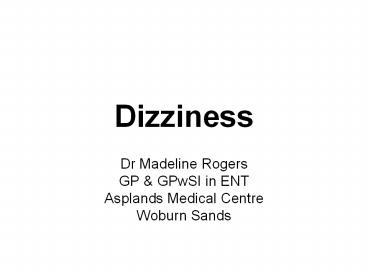Dizziness PowerPoint PPT Presentation
1 / 15
Title: Dizziness
1
Dizziness
- Dr Madeline Rogers
- GP GPwSI in ENT
- Asplands Medical Centre
- Woburn Sands
2
Balance-input
- Eyes
- Somatosensors esp neck. Also joints/muscles/skin
- Labyrinth
- Brain stem vesicular nuclei
- Cerebellum
- Cortex
3
What do you mean by dizziness?
- Giddiness
- Lightheadedness
- Vertigo
- Unsteadiness
- Clumsiness
- faintness
4
Balance Impairment
- Eyes- Poor vision- balance worse in poor
lighting. Poor propioceptive input loss of
visual horizon - Impaired somatosensors- elderly peripheral
neuropathies - Labyrinth- vertigo
- Brain stem- CVA tumours MS- initial attack may
be difficult to differentiate from acute
vestibulitis. Patient may complain of
lightheadedness, being clumsy and /or vertigo.
The vertigo tends to be persistent
non-positional - Cerebellum- clumsiness Move to side of lesion.
Symptoms are progressive. - Cortex- syncope
- Anxiety- hyperventilation etc
5
Balance Impairment
- Light-headedness- syncope-
- positional- postural hypotension
autonomic neuropathy (DM)
anaemia hypovolaemia - Non positional - hypoglycaemia cardiac e.g.
arrhythmias gastrointestinal e.g.
dumping - Functional- anxiety / hyperventilation
- Unsteadiness- periperal neuropathies
- e.g. neuropathic feet in DM alcohol small cell
lung Ca B12 deficiency Drugs eg
allopurinol,INAH,nitrofurantoin heavy metals - Clumsiness- stagger to side of lesion
- past-pointing
loss of fine movementhypotonia - Vertigo- peripheral central
- Mixed- MS CVA
6
Vertigo
- Hallucination of movement
- Is it vertigo? Is it dizziness?
- did you feel light-headed or did the world spin
as if you had just got off a playground
roundabout - Establishing vertigo narrows the diagnosis to
disorders of labyrinth or its central
connections. - Peripheral - Middle ear disease
- Benign Paroxysmal
Positional Vertigo - Acute vestibular
Neuronitis-labyrithitis/acute vestibular failure - Menieres
- Head injury-fracture of
temporal bone/surgery - Drugs- aminoglycosides/
furosemide - Central- Vestibular migraine
- Cerebellar or brainstem
stroke - MS
- Tumour
7
Middle ear disease
- Acute AOM-
- Chronic suppurative otitis media- cholesteatoma
eroding into inner ear labyrinth- suspect with
vertigo and discharging ear - Trauma after stapedectomy for otosclerosis due to
perilymph leak.
8
Acute Vestibular Failure
- Aka- acute labyrinthitis/ acute vestibular
neuronitis - Probably viral . Acute vertigo with vomiting
Usually lasts 1-7 days but takes weeks for
compensation to occur. - Seasonal outbreaks
- Central compensation can be delayed but use of
vestibular sedatives eg prochlorperazine. Ok for
short use in acute phase as inj/ supp/s/l - BPPV may follow because calcium deposits break
off damaged otoconia. Thus prolonging symptoms. - Central compensation may be very delayed or
incomplete in elderly
9
Benign Paroxysmal Positional Vertigo
- May follow acute vestibular failure or head
injury. - Episodic
- Positional- provoked by turning to affected side.
- Lasts seconds minutes. Often when turns in bed
- Effect fatigues eg in repeated testing
- Otoconial debris usually in posterior canal
- Dix-Hallpike test- vertigo provoked with
torsional nystagmus short duration
fatiguability - Vestibular sedatives no therapeutic advantage.
- Positional manoeuvres exercises to treat eg
Epley Daroff-Brandt
10
Menieres Disease
- Triad of symptoms Rotational vertigo
- Loss of
hearing - Tinnitus
- Affects young- middle aged
- Lasts 1-24 hrs
- Prodromal phase- feeling of fullness in ear
- No vertgo between attacks
- Hearing loss- low frequency progressive with
attacks - Can be unilateral or progress to bilateral
- Management initially medical. Stop smoking
reduce salt caffeine. - diuretics
- vestibular sedatives
11
Menieres Disease
- If medical fails
- Surgical referral
- Grommets
- Chemical ablation
of labyrinth with gentamycin
instilled transtympanically or
directly to round window niche. - Surgical
labyrinthectomy - Neurosurgical
division of vestibular nerve - Hearing loss
12
Examination
- Good history essential examination may be normal
- Observe
- CVS- pulse / BP /carotids
- Ears- tympanic membrane tuning fork testing
- Romberg- perform standing on thick foam. Removes
proprioception via long tracts. Isolates
vestibular mechanism - Unterberger- turns to hypoactive side. Problem if
other muscle /joint disorders - Neuro-otological exam- Cranials . Cerebellar
function - Head Thrust- Vestibulo- ocular reflex
- Dix- Hallpike test
13
Investigations
- Audiometry- asymmetrical snhl-
- MRI to exclude acoustic neuroma or any
cerebello-pontine angle tumour
14
Red Flags
- Refer-
- Severe progressive symptoms
- Balance disorder associated with hearing loss
- Vertigo with unilateral snhl or unilateral
tinnitus - Any assoc neurological symptoms suggestive of
brainstem CVA - Vertigo with chronic suppurative otitis
media-chloesteatoma eroding into inner ear
15
Dizziness in The Elderly
- Multisystem failure
- Polypharmacy
- Poor eyesight
- Cardiac problems
- Cerebrovascular disease
- BPPV
- Burnt out menieres
- Vestibular failure
- Incomplete central compensation
- Peripheral neuropathies
- Muscle weakness
- Arthritic joints

